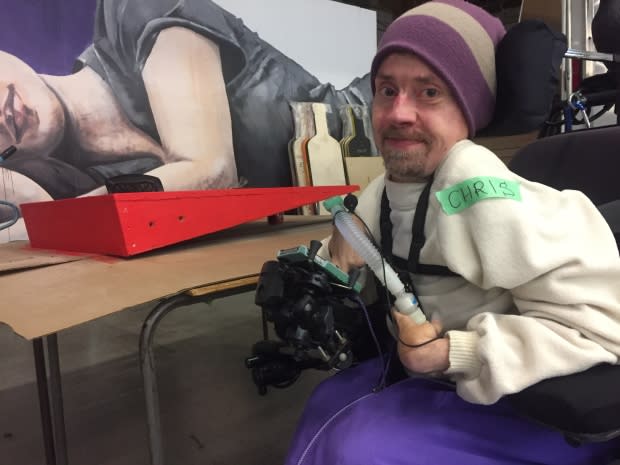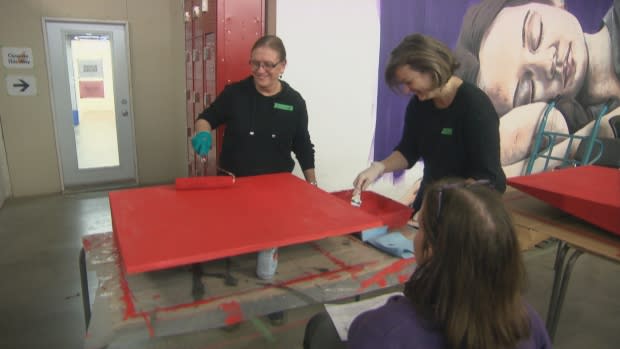Closing the accessibility gap, 1 ramp at a time
Wielding hammers and paint brushes, volunteers gathered at Makerspace North one recent evening to take part in Stopgap Ottawa's fourth community ramp build.
Their goal: to make 10 local businesses more accessible to customers who use wheelchairs.
'I just want to get to the point where people understand that one single step, it's a symbol of exclusion.' - Kenzie McCurdy, organizer
"It's a really weird feeling, not being able to enter a place that everybody else can enter," said Chris Binkowski, co-founder of Stopgap Ottawa.
Often, the only obstable standing in the way is a single step, easily overcome with a small, portable ramp.

"It's nice to be able to go inside and be a regular customer. In the past, sometimes I've decided not to shop there, or I've had to have them come out and serve me, which isn't nice, especially in the wintertime or when it's raining."
Binkowski said a simple wooden ramp can make "a huge difference" when it comes to accessibility; some businesses just need a helping hand.
Co-organizer Kenzie McCurdy, who also uses a wheelchair, agrees.
"If they don't experience it, they don't know about it until I bring it up," McCurdy said. "It just makes you feel like you're second-class and not fully engaged in the community or thought about."
'A no-brainer'
Despite the obvious advantages for customers, Stopgap Ottawa has found not all businesses are immediately open to the idea of adding a ramp.
"Some people are really on board, think it's a no-brainer,'" Binkowski said. "Some people need a bit more coaxing because they are not sure about bylaws, or never thought about accessibility."
Volunteer Christina Johnson, who lives in Centretown, said it's especially challenging to get around in a wheelchair in areas with older buildings and infrastructure.
She believes in supporting local and smaller independent business, but has sometimes been frustrated.
'As a customer, I just want to be able to get in your store or restaurant.' - Christina Johnson, volunteer
"I have to pick and choose which restaurants and stores I can go to," she said. "You wonder why it's still that way in 2018."
Being served out on the sidewalk can be humiliating, Johnson said.
"Why should I have to beg to be served? It's a bit insulting. As a customer, I just want to be able to get in your store or restaurant," Johnson said.
Often, it means her partner has to go inside instead of her, while she waits on the sidewalk. "Am I a dog? Am I somebody's pet? It's a matter of dignity."

A 2-way street
Kenzie McCurdy, who helped organize the ramp build, said the project benefits for businesses, too.
"There's this whole world these businesses are missing, and there's a whole world people with mobility needs are missing as well," she said.
"I just want to get to the point where people understand that one single step, it's a symbol of exclusion."
StopGap Foundation was created in Toronto in 2011 by Luke Anderson, who sustained a spinal cord injury while mountain biking in British Columbia in 2002.
The group hopes to highlight accessibility issues in cities by installing portable ramps outside businesses with single steps, making them inaccessible.
The brightly-painted ramps are built on demand, and can be brought indoors at night.

